[027]
What Would You Do If You See An Old Woman Lying On The Ground?
(01/20/2008) In the case of Nanjing citizen Peng Yu, he helped the old
lady get up and accompanied her to the hospital. Then the old lady sued
him for pushing her into the ground in the first place. The judge ruled
against Peng on the grounds that his behavior was abnormal -- if he would not
have done so much if he did not have a guilty conscience.
(Yangzhou Evening
News) On the morning of January 17, a 73-year-old woman named
Dai slipped in the street. A young man spotted her and helped her
get up. But the friends of this young man said, "You better let her go!
You''ll be in big trouble if she says that you knocked her down." The
young man released his hand and ran away. The old woman fell down again
and aggravated her leg injury. Other citizens came and summoned the
ambulance to take her away to the hospital. According to the family of
Mrs. Dai, she broke her hip, shoulder and leg bones during the second fall.
(牛B点就像我的blog) I
interviewed the eyewitnesses and this is what I pieced together. On
early morning of January 15, 73-year-old Mrs. Dai went out as usual to shop.
It was snowing, the pavement was slippery and she fell down in front of the
jewelry store. A 35-year-old female worker from the jewelry store heard
someone slip outside. She wanted to go up and render assistance, but her
female companion told her to be careful about fraud. But they felt that
they could just let the old woman lie on the ground and they went up to help
her get up. The old lady told them not to worry because her family is
well-off.
At the time, the female worker tried to summon a tricycle to make the old lady
to the hospital, but none of the drivers would do so. The female worker
then brought out her raincoat so that the old lady did not have sit on the wet
snow. She also brought out an umbrella to cover her body from the
falling snow. The militia police eventually arrived and took the old
lady to the hospital.
In the afternoon of January 18, I went to visit Mrs. Dai in the Osteopathy
Department of the Yangzhou Number One People's Hospital. Although she
suffered multiple bone fractures on the left side of her body, she was bright
and alert. She told me that she is very grateful to the middle-aged
woman who helped her, even though she still has not learned the name.
She said that someone did remind people not to help her to get up because of
possible extortion. However, the woman did help her get up anyway.
She fell the second time because her body had gone numb, and not because of
anything the middle-aged woman did. Concerning the newspaper report on
January 18, Mrs. Dai was outraged: "This is blindly made up. This hurts
the image of the people of Yangzhou, right? How can it be written up
this way. This is totally fabricated. The woman did something
good, but this is how it gets reported."
By the evening of January 18, here are the page views of the news story: 2,500
at NetEase, 15,000 at QQ, 2,500 at Xici Hutong. The netizens focused on
whether this young man was scared by the Peng Yu case and whether he has
liability because the old lady fell when he let go of his hands suddenly.
Other netizens questioned the quality of the people of Yangzhou.
[026]
The Imaginary Kingdom Where Everything Is Staged (01/20/2008)
(Yon888)
In Nanxiang town, Hezhou city, Guangxi province, the Zhuang tribe girls bath
in the public spas as a matter of tradition. Actually, all the Zhuang
people (old and young, male and female) do the same because it is sacrilege to
the holy water not to go completely naked. The accompanying photographs
appeared on the Chinese News Service.


However, a netizen named "Little Green Dragon of the Yellow Flower Hall"
wrote: The various indications are that the "public nude bathing of the young
Zhuang girls" has a hidden "story" behind it. What might that be?
Another netizen named "The Fish In Our Village" disclosed that the girls in
the photographs came from his school. His understanding was that the
county wanted to promote spa vacations in the county and wanted to have the
school teachers pose for photographs at 1,000 RMB per person. The
teachers declined the offer, so they asked some students to pose instead.
"The Fish In Our Village" wrote: "There are many ways for the local government
to attract commercial opportunities, but is this the way to do it? These
young girls are not wanton, but they have suddenly become famous all over
China overnight. I cannot imagine how their fellow students are scorning
them right now and how this might affect their scholastic careers. Are
there any lawyers out there who can tell me how this is covered by the
<Protection of Minors Law>?"
[025] Netizens Are Getting Smarter And Smarter (01/20/2008) (He Sanwei at Southern Metropolis Daily)
[in translation]
Netizens have always been smart. In the saying "The masses are the true heroes whereas we are often naive and risible," the masses are the netizens. Yet, the cadre leaders never praise the netizens as the true heroes. On the contrary, they are suspicious of the netizens. But no matter what, the grassroots-level cadres are becoming more respectful of the netizens.
There is the saying "We went for a stroll in order to encounter a good mayor." In this saying, the citizens are like timid stepchildren sneaking out for a stroll and encounter the mayor. I believe that if it were not for the Internet platform, the strolling citizens could encounter just about anything except the mayor. The probability of that encounter occurring is like winning the 100 million RMB lottery, with a single occurrence last year.
From the technological viewpoint, the mobile telephone is the endpoint for personal information (both sending and receiving) and it is a part of the Internet. The story about "encountering the mayor during a stroll" is flawed because it is seldom replicated. But there is another method that does not share the same flaw -- instead, people can do something independently of each other, they do not have to "stroll" in the street and they can still "encounter the mayor."
On January 3, People Net published a set of photographs of the scene in a courtroom in a certain county courthouse. The chief judge, the two jurors and the clerk were all dressed in civilian clothes; the judges were using their mobile telephone while the hearing was going on and the clerk was smoking a cigarette as he listened.
This news was reported in the morning! While the judge and company were smoking and making telephone calls, someone in the court took photographs and uploaded them. The information was then quickly spread around China. The three judges never expected that before they even stepped out of the courtroom, they had already become national news celebrities. This will become a legend of this Internet era.
On the next day, People Net followed up with a news item that is the equivalent of "the mayor showed up." The chief judge of the case (who was also the Chief Justice of the court) has been "suspended pending investigation." On the previous day, the caption on the photographs said that "such behaviors are not rare in courtrooms." But once the court people achieved the honorable mentions on the Internet, they immediately felt embarrassed and took action to placate the public.
Next we follow up the cases of "the school principal being arrested for asking the county mayor's signature" and "the county police goes to Beijing to arrest a reporter." In the former case, the incident had occurred one week ago without a stir. Once a media report appeared, the Internet boiled over. Within two days, the case was completely overturned. The penalties on the arrested principal were rescinded, and his job was restored. He had been ordered to apologize to the county mayor, but now the country party secretary, mayor, public security bureau director and Department of Education director made a collective apology to him! In the latter case, China Youth Daily reported on January 7 that the Xifeng county (Liaoning province) police went to Beijing to arrest a reporter. The whole Internet was up in arms. On January 8 (the day after the report appeared), the Xifeng public security bureau had already formally withdrew the case and rescinded the arrest warrant. On the afternoon of January 9, the Xifeng team arrived in Beijing to "apologize."
Before the citizens became netizens, the grassroots-level cadres and bureaucrats could often hide the facts. Nowadays, they cannot block the entire Internet anymore because they don't have the technological means. So they have to "adapt" to the Internet and reverse themselves at Internet speed! These are things that they didn't appreciate even with decades of political training, but now they are "forced" to do so by the Internet.
The Internet has provided a technology to produce a platform with equality of information access. Each netizen has the means to participate in public issues. You do not need to be a reporter. When you observe the mess in that courtroom, you can photograph the scene and send it to any website. In the Internet era, every netizen is also a reporter.
The Internet is rapidly, profoundly and fully transforming human society. Individuals and governments must adjust themselves to the rules of the Internet. China has now become a "grand nation of netizens." China has 210 million netizens, just 500,000 behind the United States of America. China may have the most fanatical netizens in the world. They hold great, even excessive, expectations for the Internet. Their Internet existence -- whether they are able to exercise their legal rights and whether they are becoming smarter and smarter"-- affects the harmony of the entire society in China.
[024]
Hsu Hsin-Liang Checks The Numbers (01/20/2008) (UDN)
Former Democratic Progressive Party chairman Hsu Hsin-liang spoke to the press
about the prospects of DPP presidential candidate Frank Hsieh. According
to the latest Apple Daily public opinion poll, Ma Ying-jeou has a support
level of 40.8% while Frank Hsieh has a support level of 16.2%. The gap
between the two is 24.6%. The remaining 43% are decided.
At first blush, it would seem that Ma Ying-jeou is certain to win. But
Hsu said that prior experience suggests that the DPP usually adds another 20%
when the election actually arrives. If this were true, then Frank Hsieh
will get a support level of 36.2%, which is not that far away from Ma Ying-jeou's
40.8%.
Hsu also pointed out that the voter turnout in the Legislative Yuan elections
was only around 60%. In previous presidential elections, the turnout
rate was around 80%. The extra 20% will be the target group for both
camps.
Hsu said that in the January 12 Legislative Yuan elections, the KMT received
about 55% of the votes while the DPP received about 40%. Among the KMT
party votes, about 20% came from local groups, who are voting for their local
candidates for their own local interests. When the presidential election
comes around these local groups may not automatically vote for Ma Ying-jeou,
as their ideology is probably closer to the DPP.
Hsu describes himself as "neither blue nor green." He said that there
will be a "watermelon" effect as well as a "pendulum" effect in the
presidential election. He believes that the "watermelon" effect will
manifest itself mainly in the form of campaign contributions, but the
"pendulum" effect will show up in the actual voting. Therefore, the
"pendulum" effect will be bigger.
Hsu said that the biggest burden on the DPP right now is President Chen
Shui-bian and the fundamentalists. Certain light-blue candidates who did
not want to come out to vote. But because they could not stand the
emotionalism of the fundamentalists, they came out to teach the DPP a lesson.
Hsu believes that if Frank Hsieh can severe himself thoroughly from President
Chen Shui-bian, then it would help his campaign. Specifically, he meant
the resignation of the three "insane fundamentalists": Minister of Education
Tu Cheng-sheng, Government Information Office Minister Shyh Jhi-wei and
Ministry of Education secretary general Chuang Kuo-jung.
Hsu said that in this media era, a single sentence can sometimes completely
turn around public opinion. There is still two months to go before the
presidential election, and so the DPP still has a fighting chance.
[Announcement]
獨立媒體離線沙龍:和諧政治中的雜音
在和諧為本的審查制度下,國內的博客們,以不同的方法去作民間報導,表達自己的意見,以吃蟹為樂;而又有一些充當橋樑的博客,以飛快的速度,把國內博客的文章翻譯轉載;這些經驗,對強調國情教育的香港,有什麼啟發呢?
講者:
北風 (國內BLOGGER)
宋以朗 (譯評博客,把國內,香港和台灣的在地新聞和互聯網消息,譯成英文發放海外)
主持:
林藹雲 (香港獨立媒體網和 Globalvoicesonline編輯)
時間 /地點:
2008年1月19日(星期六 ) 下午15:00-18:00
灣仔軒尼詩道365號富德樓9樓
[023] Very Grand, Very Strong Television Interviews Of Citizens In The Street With Unique Chinese Characters (01/18/2008) (China.org.cn)
Joel Martinsen (Danwei) noted that in Chinese non-attributive forum culture, history is doomed to be repeated. Specifically, he had noted these photographs in 2004 (see The Voice of the People).
On December 27, <Joint News Broadcast> showed a news story in which a 13-year-old girl used "Very Yellow, Very Violent" to describe a web page that she came across. This phrase immediately became the hottest phrase on the Chinese Internet. At the same time, the previously rarely known website Saohuang.cn ("Sweep away pornography") suddenly became popular.
Saohuang.cn was founded on August 28, 2007. This is a typical Web 2.0 website. On the website, there is a list of websites (including their names, screen captures and URLs) that the visitors are asked to rate as either "porn" or "not porn." Each website will then accumulate an "average porn index" based upon these inputs.As a result of this mode of operation, some people suspect that SaoHuang.cn is actually spreading porn, albeit unintentionally.
yWeekend: After the sudden popularity of "very yellow, very violent," has your traffic volume soared?
Saohuang.cn: We used to have about 500 plus unique IP visits per day. Now we are getting 5,000 plus. But we don't really care about these numbers.yWeekend: The number of actual complaints sent to the website has not increased by a lot. So most of these new visitors did not come to file complaints against websites?
Saohuang.cn: Recently, there were clearly more complaints from anonymous as well as newly registered users. These are new people. We cannot exclude the possibility that some people are using Saohuang.cn as a guide to look for porn websites. However, Saohuang.cn is only bringing tens (or at most hundreds) of visitors where those websites can get hundreds of thousand or even millions of visitors through their own promotions. So who is having a worse influence?yWeekend: I entered "Saohuang.cn" on Baidu and the first link is "The extreme temptation from girls with big tits -- Saohuang.cn." That website contained a large number of photographs with suggestive captions. Now that your audience reach is bigger, aren't you objectively re-disseminating harmful content further?
Saohuang.cn: ... No matter whether Saohuang.cn end up giving free promotions to these websites, they still exist out there. People who want to see those contents will find some way of reaching them ...
[021]
Taiwan By The Numbers (01/17/2008) (TVBS)
(1,017 persons interviewed on January 14-15, 2008)
If the presidential election were held tomorrow, who would you vote for?
56%: Ma-Siew (KMT)
26%: Hsieh-Su (DPP)
Irrespective of whom you would vote, which team do you believe is more likely
to win?
57%: Ma-Siew (KMT)
10%: Hsieh-Su (DPP)
Before the Legislative Yuan elections on January 12, the supports levels had
been 53% for Ma-Siew and 30% for Hsieh-Su, while the predicted winners were
43% for Ma-Siew and 20% for Hsieh-Su.
A cross-tabulation against presidential election voting in 2004 showed that
among those who voted for Chen-Lu (DPP) last time, 62% supported Hsieh-Su (DPP)
but 27% now support Ma-Siew (KMT). Among those who voted for Lian-Soong
(KMT/PFP) last time, 90% support Ma-Siew (KMT) and 3% support Hsieh-Su (DPP).
[020] Who Is In Charge Of Making The Surrender? (01/16/2008) (Wong Onyin in Hong Kong Economic Journal)
[in translation]
More than twenty thousand people marched? Is that a lot? Or not? In 2004, the National People's Congress rendered an interpretation of the Basic Law of Hong Kong and rejected the possibility of double universal suffrage in 2007/2008. In order to express their anger and opposition, the people of Hong Kong marched from Victoria Park to the China Liaison Office. How many people were in that march? Also 20,000!
Everybody knows what happened after the democrats said back then that they would insist on striving for universal suffrage in 2007/2008. After vetoing the proposed political reform bill (for the Legco election in 2008) in December 2005, the pan-democrats achieved nothing of significance. In 2006, the Civil Human Rights Front organized the July 1st march with a slogan for "Insist on striving for universal suffrage in 2007/2008." In mid-2006, the Civic Party was founded with a call for everybody to leave the June 4th baggage behind. In October that year, the Civic Party announced its participation in the small circle election. Simultaneously, without any explanation, they adopted 2012 universal suffrage into their political platform. Just like Tung Chee-hwa who thinks face is more important than honesty, if the pan-democrats don't talk about fighting for something after a while, it means that they have abandoned the effort.
With that history in mind, how could the pan-democrats exploit the 20,000 spirited citizens once more? The slogan of this march was "Insist on striving for double universal suffrage in 2012, reject fake democracy in 2017." Will the pan-democrats really be able to continue to insist?
On December 24, I published the column "Anson Chan is charge of surrendering" here. She entered the Legco by-election as the first person to retreat from 2012 double universal suffrage at a time when the pan-democrats knew full well that there was no hope for 2012.
The quality of Hong Kong political reporters is so poor. On the day before the march, Anson Chan published an essay in two newspapers to declare that she was no longer insisting on double universal suffrage in 2012. She reversed her campaign promise less than one month ago. Not a single reporter asked her why she betrayed her campaign promise, or how she could betray the public trust so easily.
The beginning of Mrs. Chan's essay immediately betrayed the citizens and pan-democrats. She wrote: "I want to state that I have no intention of opposing the central government." Does she mean to say that the pan-democrats are opposing the central government? That the citizens are slick disobedient people? And that is why she is drawing a line to distinguish herself from them! She added: "I think now is the time to put down our differences and re-focus on establishing a clear road map and time table for universal suffrage in the 2017 Chief Executive election and the Legco election at not later than 2012.
So in what way or manner is the political position of Anson Chan different from those of Donald Tsang, Regina Ip, the DAB and the Liberal Party? For Mrs. Chan to publish this essay one day before the march "to strive for double universal suffrage in 2012," isn't this a betray of her supporters? She carried a personal slogan during the march: "Implement genuine universal suffrage as quickly as possible, strive for clear road map." Naturally, she did not dare to mention 2012. If this is not being thick-skinned, what is?
[019] What If Zhu Wenna Were A Peasant Woman? (01/16/2008) (Lin Da at Southern Metropolis Daily)
[in translation]
Near the beginning of this year, four police officers from Xifeng county, Liaoning province went to Legal System Daily to serve a summons to reporter Zhu Wenna. This drew a strong public response that ultimately made the Xifeng government withdraw the case. This seemed to be old news by now. But I am still waiting for further developments because I want to know more details and what the various people were thinking.
I want to know what the Xifeng government and the four police officers were thinking. Zhu Wenna's article appeared on January 1st. On January 4th, the four police officers arrived in Beijing with the summons. The Xifeng county party secretary Zhang Zhiguo claimed that he had never heard of this case. So who was responsible for setting the up case, evaluating the evidence and issuing the summons? Without the orders of superiors, the four police officers could not have gone to Beijing to make an arrest. If Xifeng county party secretary Zhang Zhiguo was not the person who ordered them, then who is it? On what legal basis did this unidentified person act? What is his/her understanding of the law?
According to the report, the "Beijing police" were also present when the four Xifeng police officers arrived at Legal System Daily to make the arrest. I would like to have an explanation from the Beijing police. When the four Xifeng police officers showed up, they obviously had the required documents whereupon the Beijing police accompanied them to the newspaper under the Chinese Central Politics and Law Committee without any delay. So which "Beijing police" department was it? When he/she worked with the county police from Liaoning person to arrest a Beijing citizen within his/her jurisdiction, does he/she know what the relevant laws are? Beijing is the capital city of China with many senior officials for various departments and ministries. Do the "Beijing police" cooperate with any outside police officers to arrest people? What if the outside police officers wanted to arrest a senior central government official? There has to be certain standards and requirements for the "Beijing police" to meet before they can cooperate in such matters. I would like to hear the explanation from the Beijing police.
I also wanted to hear the explanation from the workers at the Beijing Legal System Daily. As legal media workers under the Central Politics and Law Committee, they obviously know about the law. When police officers show up at the newspaper to arrest a reporter, it does not mean that the reporter is guilty. The guilt of the reporter should be determined in court. Reporters do not have the special right of not being arrested. If Xifeng county was wrong about the case, then it is possible to argue so in court. If Zhu Wenna and her colleagues held a fundamental trust in the justice of the court, they would have stood in front of the court and defend her. But the newspaper workers did not turn Zhu over to these police officers. Instead, they arrange for her to go into hiding and thus prevented the police officers from carrying out the police. When the police officers could not effect an "arrest" through obstruction, this is nothing to celebrate over. So what problems about the legal system and process did this affair show?
The four Xifeng police officers did not sneak into Beijing. They had all the right documents and they were accompanied by the Beijing police in broad daylight. But their actions drew a strong public reaction such that Xifeng was forced to rescind the case and issue an apology. This shows that many people have lost their basic trust in the local judicial systems. Based upon prior information, people do not believe that a citizen would receive justice from the court if arrested. It is not a good thing for society when this distrust is so widespread. The reason why the Xifeng government failed to arrest Zhu Wenna this time was because she is a reporter at a major newspaper. When Sun Zhigang was beaten to death in the detention center, he was a mere university student. In fact, this was not the first time that Xifeng police went to arrest someone in Beijing. When they arrested the businesswoman Zhao Junping (whose story was reported by Zhu Wenna), there was not a stir. If Zhu Wenna had been a peasant woman instead of a reporter, would the Xifeng police fail? So shouldn't we ask whether the countless number of people arrested (such as Zhao Junping) received justice from the legal system?
[018] In
Search Of "Sister Chastity" (01/15/2008) (MOP,
Daqi) At first, a netizen posted this personal account: "Last night, I
was at a pub in 1912 (Nanjing) and I noticed an intoxicated female losing a
bet with her companions. In that bet, the loser had to do whatever the
winner wants. I was shocked when the man actually ..." This was
accompanied by three photographs:
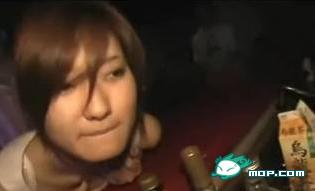


This led lead to the first "Internet human search" of 2008 because some
netizens were upset by this female's lack of chastity (and yet her title is
"Sister Chastity"?). At the same time, other people analyzed the three
photographs and raised doubts:
- This is winter and the man behind her is wearing a short-sleeve shirt?
- This isn't Nanjing! I am positive! The Oolong tea is sold in
supermarkets and convenience stores only in Japan. This is served to
women who need to dilute hard liquor.
- I am a frequent visitor to the pubs at 1912. I have never seen
such a daring public show. This occurred in the open area and not in an
enclosed suite.
- I don't which 1912 pub has a stairwell and red carpets? Where
are the security guards for the pub?
- It does not matter whether this was an actual incident or someone
fabricated it. Suppose this was true -- but it is still someone else's
private affair which does not call for the invocation of the first Internet
human search of 2008. Most of the people calling for this are men.
What do they want? Are they seeking justice? Justice for what?
- There are so many flaws in these photographs. Someone ought to
give them to the Shaanxi provincial Forestry Department and let them find some
authoritative organization to authenticate them.
[017]
Chairman Mao Smirks (01/15/2008) On January 14, 2008,
Global Times
reported that the French automobile manufacturer Citroén has been running a
full ad in the newspaper El Païs (Spain) with a computer-altered photograph of
Chairman Mao Zedong. The fine print reads: Ït is for certain that we
rule, but for the revolution has not stopped for Citroén ..." This ad
drew a strong response from Chinese residents of Spain, who protested the
insult. In Spain, it is against the law to insult members of the royal
family, but there are no corresponding laws against insulting foreign leaders.
On January 15, 2008,
Global Times
reported that Citroén has stopped the ad and issued an apology to the effect
that they would never knowingly use an ad to hurt the feelings of the Chinese
people.
After reading those two Global Times report, you still have no idea what that
print ad was apart from the description. But nowadays, you can find
everything on the Internet. The following photograph appeared at the
OPPO BBS:
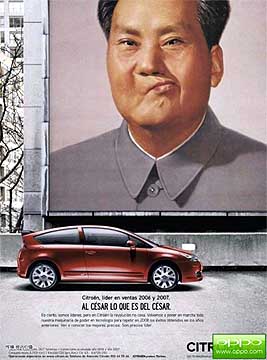
[016]
Hong Kong By The Numbers (01/15/2008) (Ming
Pao,
Sing Tao) On Sunday, the Hong Kong University Public Opinion
Progamme sent out a team of reseachers to estimate the number of the attendees
in the demonstration march for double universal suffrage in 2012. The
resulting estimate was between 10,000 and 12,000, which is almost half of the
22,000 announced by the organizing unit.
Hong Kong University Public Opinion Programme uses their traditional method of
making headcounts from the pedestrian bridge at the intersection of Hennessey
Road and Arsenal Street. Between 4:38pm (when the first marchers
arrived) and 5:35pm (when the last marchers passed by), they estimated 8,393
persons going by. After adjusting for the number of marchers who left
before or joined after the observation point (which is a factor between 1.18
and 1.38 based upon the telephone interviews conducted after the December 4,
2005 march), the estimated total was between 10,000 and 12,000. HKU POP
added that this research is not sponsored by any organization.
According to Civil Human Rights Front deputy convenor Jackie Hung, their
workers counted people row by row and produced an actual count. She
pointed out that it did not matter what the number was because the demands of
these citizens cannot be ignored. "Why doesn't the HKU POP go and tally
the demands of these people? Isn't that more practical?"
According to the police, 6,800 persons departed from Victoria Park and 6,000
persons arrived at Government Headquarters. The Civil Human Rights Front
claimed that 5,000 persons departed from Victoria Park and a total of 22,000
persons participated. There is no explanation as to how 22,000 could be
counted row by row.
[015]
Hong Kong By The Numbers (01/15/2008) (HKU
POP) (1,025 persons Cantonese-speaking Hong Kong residents were
interviewed on January 9-11, 2008. The sample was randomly drawn from
the telephone directory with randomization of last digits. When a home
is reached, the person whose birthday is next is the designated interviewee.
This project is sponsored by Apple Daily.)
Q1. Article 45 of the Basic Law states that the method for selecting the Chief
Executive will eventually be universal suffrage based upon practical
conditions and the principle of gradualism. Which date would you want
universal suffrage for the Chief Executive to occur?
43.8%: 2012
41.6%: 2017
3.6%: 2022
3.3%: 2027
7.7%: Don't know/hard to say
Q2. Article 68 of the Basic Law states that the method for selecting the
Legislative Council will eventuall be universal suffrage based upon practical
conditions and the principle of gradualism. Which date would you want
universal suffrage for the Chief Executive to occur?
47.3%: 2012
25.3%: 2016
13.3%: 2020
2.1%: 2024
3.3%: 2028
8.9%: Don't know/hard to say
Q3. The National People's Congress Standing Committee recently rejected double
universal suffrage for 2012, but it decided that universal suffrage for the
Chief Executive could occur in 2017 and that for the Legislative Council could
occur in 2020 at the earlier. After this NPCSC decision, certain people
said that they will continue to fight for double universal suffrage in 2012.
Do you support or oppose this action?
17.8%: Very supportive
22.2%: Somewhat supportive
22.3%: Half/half
18.0%: Somewhat opposed
12.9%: Very opposed
6.8%: Don't know/hard to say
[014]
Hong Kong Newspaper Headlines (01/14/2008) Here are the eight
newspapers that show their top news story online. Four out of eight
chose the toy helicopter accident and two chose the pro-democracy march.
So this is where we are ...

The Standard:
March Against Time
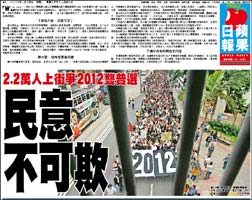
Apple Daily:
22,000 persons marched in the streets
for double universal suffrage in 2012
The people's will cannot be bullied
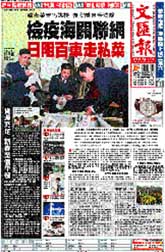
Wen Wei Po:
Disease Control & Customs cooperate
To stop a hundred vegetable smuggler trucks a day
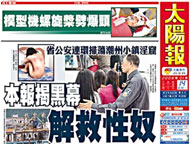
The Sun:
Our news exposé
liberated sex slaves
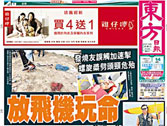
Oriental Daily:
Toy airplanes are
life-threatening
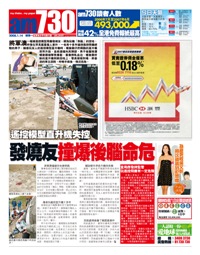
am730:
Avid hobbyist banged in the head
in critical condition

Headline Daily:
"Helicopter" went out of control
Expert gets blow in the head
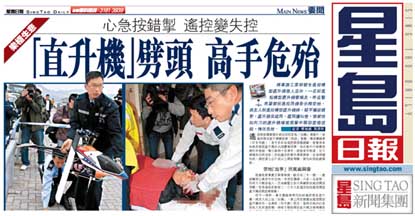
Sing Tao Daily:
"Helicopter" lands blow on head
Expert in critical condition
[013]
The January 13th March in Hong Kong (01/14/2008)
(Apple
Daily) 22,000 people marched in the streets for double universal
suffrage in 2012. The people's will cannot be bullied.

Here are some photographs:


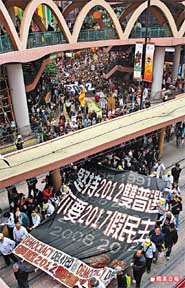


Alas, there are also photographs of banners and demonstrators that never
appear in the mainstream Hong Kong news coverage. This is the big
elephant in the house that everybody pretends not to know about. Here is
one photograph from
DWnews:

On one hand, diversity of opinions is a good thing and should be defended.
On the other hand, if that is the position of today's march, then you can
forget about any 'dialogue' with the central government. Do you think
that they would talk to someone who wants them dead?
[012]
Taiwan By The Numbers (01/14/2008) (UDN)
(855 adults were interviewed on the evening of January 13, 2008, with 365
others refusing).
In the aftermath of the Legislative Yuan elections, the support level for
KMT's Ma-Siew team surged to a historical high of 60%, while DPP's Hsieh-Su
team dropped to a historical low of 18%. Previously, the numbers had
stabilized to around 51% for Ma-Siew and 25% for Hsieh-Su since August 2007
(when Ma Ying-jeou was found not guilty of embezzlement in the first court
trial).
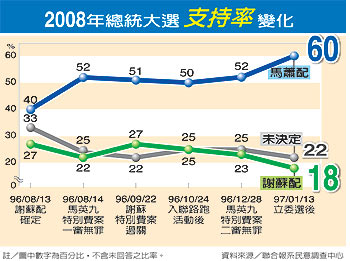
Irrespective of which team the respondents supported, they were also asked
which candidates were favored. 63% thought the Ma-Siew team are likely
to win, while 9% picked the Hsieh-Su team. This is a historical high for
Ma-Siew and historical low for Hsieh-Su. Among the 'green' respondents,
44% thought Ma-Siew would win and 29% thought Hsieh-Su would win.
Previously, 50% of the 'green' respondents thought Hsieh-Su would win.

[011]
Taiwan By The Numbers (01/14/2008) (China
Times) (1,004 adults interviewed by telephone on the evening of
January 13. The sample of telephone numbers were drawn from the Taiwan
residential telephone directory and then the last two digits were randomized.
The results were weighted by gender, age and geography.)
With respect to the presidential election in March, 51% of the respondents
supported KMT's Ma-Siew team while 20% supported DPP's Hsieh-Su team.
The Ma-Siew figure is a historical high for the China Times tracking polls.
Irrespective of the whom the respondents supported, they were asked which
candidates were favored to win. 47% thought that Ma-Siew were likely to
win, while 6% picked the Hsieh-Su team. Compared to the last poll before
the Legislative Yuan elections, Ma-Siew went up 13% while Hsieh-Su went down
3%.
With respect to the new Legislative Yuan election system, 50% approved it, 27%
disapproved and 23% could not decide. With the respect to the KMT
victory in those elections, 59% were satisfied, 25% were dissatisfied and 17%
HAD NO opinion.
Why did the DPP lose? 26% thought that the reason was the Chen Shui-bian
government had no accomplishments to speak of; 17% thought that it was the
corruption and greed stories about the First family and other government
officials; 15% thought that it was the lack of economic results from the
Executive Yuan; 8% thought people were disgusted by Chen Shui-bian's
manipulation of ethnic divisions and ideology.
[010]
Ramblings Of A Drunkard (01/14/2008) If you check
the announcement below, you will note that I am one of two speakers at an
InMediaHK salon on "Noises in the midst of harmony" on January 19. The
subject is about blogging in mainland China in an era or harmonization (also
known under the homonym of 'river crab'). The co-speaker is mainland
Chinese blogger Beifeng, who runs the
Ramblings of a Drunkard blog. For the longest time, I have been
a faithful reader of that blog. That much should be obvious because of
the frequency by which I link to the blog's weekly report on the major
Internet affairs. It is my benchmark of personal success to see that I
had covered those major incidents independently on my own. Sometimes, I
missed out on something and I immediately rushed out to make amends.
But this salon will not be an affair for mutual admiration. Instead, we
hope to have a meaningful discussion with the attendees about life in a time
of increasingly ineffective censorship. On my part, I live in Hong Kong
and I don't live under the stress of mainland Chinese bloggers. But I
will say two or three things that I know about it (oh my, that is the name of
a Jean-Luc Goddard film ...)
[Announcement]
獨立媒體離線沙龍:和諧政治中的雜音
在和諧為本的審查制度下,國內的博客們,以不同的方法去作民間報導,表達自己的意見,以吃蟹為樂;而又有一些充當橋樑的博客,以飛快的速度,把國內博客的文章翻譯轉載;這些經驗,對強調國情教育的香港,有什麼啟發呢?
講者:
北風 (國內BLOGGER)
宋以朗 (譯評博客,把國內,香港和台灣的在地新聞和互聯網消息,譯成英文發放海外)
主持:
林藹雲 (香港獨立媒體網和 Globalvoicesonline編輯)
時間 /地點:
2008年1月19日(星期六 ) 下午15:00-18:00
灣仔軒尼詩道365號富德樓9樓
[009] Hong Kong By The Numbers (01/13/2008) (Hong Kong Research Association) (1,108 person interviewed by telephone on January 7-10, 2008)
Q1. Overall, how do you feel about the National People's Congress Standing Committee's decision?
56%: Satisfied
30%: Dissatisfied
14%: No opinion
Q2. Do you think that the NPCSC decision helps promote democracy in Hong Kong?
52%: Yes
33%: No
15%: No opinion
Q3. The NPCSC decided: "The method for choosing the Chief Executive and the Legislative Council in 2012 can be amended." How do you feel?
55%: Satisfied
24%: Dissatisfied
21%: No opinion
Q4. The NPCSC decided: "The Chief Executive and the Legislative Council will not elected by universal suffrage in 2012." How do you feel?
36%: Satisfied
33%: Dissatisfied
31%: No opinion
Q5. The NPCSC decided: "In the 2012 Legco elections, the ratio of functional constituency seats versus directly elected seats shall remain 50%/50% again." How do you feel?
49%: Satisfied
30%: Dissatisfied
21%: No opinion
Q6. The NPCSC decided: "The Chief Executive shall be elected by universal suffrage in 2017." How do you feel?
65%: Satisfied
25%: Dissatisfied
10%: No opinion
Q7. The NPCSC decided: "After the Chief Executive is elected by universal suffrage, the Legislative Council can also do the same." How do you feel?
60%: Satisfied
25%: Dissatisfied
15%: No opinion
Q8. The NPCSC decided: "The nominating committee for the Chief Executive shall be formed based upon the existing rules for the Electoral Commission." How do you feel?
48%: Satisfied
27%: Dissatisfied
25%: No opinion
[008]
Taiwan By The Numbers (01/13/2008) (Apple Daily)
(287 persons interviewed by automated push-button telephone technique)
Q. Who is responsible for the DPP performance in the Legislature elections?
82%: Chen Shui-bian, whose eight years as president were truly bad
6%: Minister of Education Tu Cheng-sheng and Ministry of Education
secretary-general Chuang Kuo-yung, because they talked too much
5%: The DPP candidates themselves, because their own performances had
been poor
0%: Frank Hsieh, because this presidential candidate did not campaign
hard enough
6%: Don't know/no opinion
[007]
Taiwan By The Numbers (01/13/2008) In the Taiwan
legislature elections on January 12, the Democratic Progressive Party led by
its chairman Chen Shui-bian had a publicly stated goal of 50 seats in the
113-seat parliament. The bar for victory/loss was set at 45 seats, so 50
would be a big victory. They know that they can get 40 seats and they
intend to play the "crisis card"(i.e. if the KMT gets 2/3 of the seats, it
would be catastrophic for Taiwan) to reach 45. The actual result was 27
seats for the DPP.
What happened here? Earlier in the week, Chen Shui-bian said, "During
the many election activities in various places (including accompanying the
candidates to go into the streets to solicit votes), we discovered that the
election situation is very different from the actual public opinion poll
results. Therefore, the interpretation of the public opinion poll
results this time may have to be re-written for history."
But what were the public opinion polls saying? The following table is
compiled from the list of polls conducted by
TVBS one to three months before
the elections. The entries show the percentages for the KMT candidate
versus the DPP candidate; the green entries are those in which the DPP
candidate is ahead. Before the actual election results came in, poll
results such as these are contemptuously dismissed as "pan-blue" polls and
therefore automatically worthless.
District TVBS Poll Actual Result Taipei City 1 57% vs. 26% 60% vs. 39% Taipei City 2 51% vs. 27% 52% vs. 46% Taipei City 3 51% vs. 25% 60% vs. 38% Taipei City 4 50% vs. 27% 62% vs. 35% Taipei City 5 44% vs. 26% 58% vs. 41% Taipei City 6 59% vs. 24% 67% vs. 32% Taipei City 7 60% vs. 19% 66% vs. 32% Taipei City 8 55% vs. 19% 72% vs. 26% Taipei County 1 49% vs. 21% 58% vs. 40% Taipei County 2 31% vs. 24% 40% vs. 43% Taipei County 3 47% vs. 29% 48% vs. 50% Taipei County 4 46% vs. 30% 52% vs. 47% Taipei County 5 45% vs. 33% 52% vs. 47% Taipei County 6 51% vs. 28% 57% vs. 43% Taipei County 7 51% vs. 24% 56% vs. 42% Taipei County 8 47% vs. 31% 60% vs. 40% Taipei County 10 52% vs. 23% 60% vs. 39% Taipei County 12 45% vs. 17% 52% vs. 38% Chiayi County 1 35% vs. 34% 58% vs. 42% Chiayi County 2 26% vs. 41% 42% vs. 57% Kaohsiung City 1 53% vs. 25% 58% vs. 41% Kaohsiung City 2 43% vs. 33% 49% vs. 51% Kaohsiung City 3 44% vs. 28% 49% vs. 43% Kaohsiung City 4 43% vs. 29% 51% vs. 47% Kaohsiung City 5 32% vs. 40% 46% vs. 52% Tainan City 1 47% vs. 30% 50% vs. 50% Tainan City 2 40% vs. 38% 48% vs. 50% Tainan County 1 31% vs. 36% 45% vs. 55% Tainan County 2 25% vs. 42% 41% vs. 59% Tainan County 3 32% vs. 37% 47% vs. 53% The data above may be somewhat dated because they were taken one to three months before. One month before the election, if a candidate should see the unfavorable poll numbers, it is certain that all stops will be pulled out to go negative and some of the mud that got slung around may just stick.
There is also a TVBS poll about political party support that was published on January 1, 2008. When applied to the 34 seats in the political party section of the legislative election, the KMT should be getting 34 x 65 / (65 + 29) = 24 seats while the DPP should be getting 10 seats. The actual results were 20 versus 14.
In hindsight, is it so hard to see a landslide coming for the KMT? So what were the election situations that Chen Shui-bian was seeing in the streets? How should the interpretation of the public opinion polls be re-written for history?
[006] Another Reading Of The "Very Yellow, Very Violent" Incident (01/12/2008) (Zhao Yong at Southern Metropolis Daily)
... In the media reports, I have seen this defense of the young girl -- she is only thirteen years old, her values and judgment are yet unformed and she is therefore not responsible; even if she lied, she cannot be held responsible for she is only a victim of the system of the parents, the school, the teachers, the media and the reporters.
This type of defense is logical, but I want to consider this matter further. Among the doubters, some believe that "Very yellow, very violent" sounded too much like adult talk. Thus, she was guilty of lying or colluding with the reporter. I happen not to think so because I think that she was only using her standard narrative. The interesting thing is why did she spontaneously say something to the camera that she did not really mean?
For the longest time, our school system has encouraged people to lie. In the 1960's and 1970's, it was common to include clichés such as "The situation has never been better in China ..." in the opening sentence of any essay composition. Although these types of phrases have disappeared, the habit of the big lie has not been eradicated. Instead, they continue to show up in different forms. The students know that they don't mean to say something, but they are still being forced to do so. One time, my son showed me a model essay and said angrily that this was a piece of junk. When I suggested that he did not have to use it, he said that the teacher has already threatened him with poor mid-term grades if he refused to write in that manner.
This example shows that our students are still unable to speak what they think. They can say whatever they want in private. But when in comes to writing essay compositions, they have to trot out all the ostentatious clichés and myths. After toiling under this type of educational system for so long, they now have this natural habit. When they are asked to speak in public, those words come out spontaneously without thinking. When that little girl in Beijing faced the camera, she spoke fluently. Such is the result of the "state ideological apparatus."
According to Althusser, the "state ideological apparatus" includes the schools as well as the media such as television. Therefore, we cannot underestimate the impact of television. When I watch CCTV's <Joint News Broadcast>, I find an interesting phenomenon. Whenever something big happens, the reporters conduct street interviews and the interviewees play along perfectly by spouting phrases that are distinctly CCTV-like. So I realized that the official version has travelled a strange journey. When the propaganda machine gets started, the official version is implanted deeply into the subconsciousness of the people and their own thinking system is shoved aside. Over the long term, the official version within the people's minds is perfected even as their own system becomes increasingly barren and impoverished. By that time, when a microphone is shoved in front of them, they will spontaneously and fluently speak the official version. It goes without say that the propaganda machine will trumpet that this is the will of the people who support a certain policy. I think that this is the true secret in the interaction between the propaganda machine and the people.
Therefore, if we accept that the Beijing girl used some very CCTV-like phrases, then we must also admit that this type of talk has a broad foundation among the masses. While the girl deserves our sympathy for her experience, what she said deserves our reflection.
Relevant link: "Very Yellow, Very Violent"
[005]
Emergency Alert System in Hong Kong (01/11/2008) In
How Many Radio Stations Are There In New
York City?, it was cited that
Jat Sew Tong speaking for the Hong Kong SAR government claimed that
there was a possibility that with nothing
restraining people from using the airwaves as they wished, emergency services
and other essential or sensitive frequencies could find themselves jammed.
This was enough to cause rage on the blogosphere because there is no evidence
that FM 102.8 being squatted upon by the pirate station Citizens' Radio
interfered with anything except for Li Ka-shing's Metro Finance station (see,
for example, Martin
Oei).
But this is going to depend on your understanding of what communication for
emergency services means? If you think that this is about the radio
frequencies used by the ambulance services and so on, then they are definitely
not using FM 102.8.
But Jat Sew Tong is most likely referring to Article 19, Chapter 19 on
Broadcast Relay Station Licencse of the Telecommunications Ordinance (see
OFTA).
(1) If in the opinion of the Chief Executive an emergency has arisen, the Authority may from time to time --
(a) issue directions to the licensee concerning the programmes and messages from any specified broadcasting station and distribute those messages to subscribe; and
(b) require the licensee to receive by means of any of the station messages of from any specified broadcasting station and distribute those messages to subscribe; and
(c) require the licensee to distribute to subscribers from any of the stations messages of any kind or description.
For example, suppose that an earthquake outside Indonesia and a tsunami is expected to arrive in Hong Kong in six hours' time with significant threat to the population. The relevant Hong Kong SAR government departments will activate the system to notify all radio/television licensees to deliver emergency messages for people to evacuate and so on. An unlicensed pirate broadcaster will not be part of that system. That is what Jat Sew Tong might be referring to.
Caveat: In the above, I am using ambiguous language because I don't know for sure what Jat Sew Tong is really referring to (and he could be talking about ambulance radio frequencies!). I am basing my explanation upon what is common practice elsewhere (see the entry on the USA Emergency Alert System at Wikipedia). Periodically, the American radio/television station interrupts its regular programming and runs a very annoying test (see YouTube) of its emergency alert system. By the way, this system failed spectacularly on 9/11 in New York City because all the major radio/television stations had their transmission antennae on the top of the World Trade Center twin towers.
[004] Director Li Yu on the Banning of <Lost in Beijing> (01/11/2008) (Yazhou Zhoukan (Asia Weekly), issue of January 20, 2008, p.40-41, via DWnews)
YZZK: Are you come up with the idea of <Lost in Beijing>?
Li: I got the inspiration from a news report in a newspaper. I think that the changes that are occurring in China right now are astonishing. But in a country where the economy is developing rapidly, people's hearts and minds are not changing fast enough to keep up. There are now many new types of human relationships, of which sex is one. That was how we came up with the creative concept.YZZK: Why did you choose to have sex as the subject of the film, because you must know that this will be a challenge movie review system in mainland China?
Li: In the mainland Chinese edition of the film, all the sex scenes were excised. A total of about 15 minutes were removed. In mainland China, there are explicit regulations that buttocks must not be exhibited, no nudity is allowed and love-making must not go on for more than three seconds. The State Administration for Radio, Film and Television removed the sex scene between the older woman and the younger man because they said that they were uncomfortable. By contrast, it is alright for an older man to go to bed with a younger woman. So this is a risible reason.In the movie, the young girl was fired from the foot bathing shop and gradually turned from an innocent and pure girl into a prostitute. They found this process to be unacceptable, so the whole episode was excised. Also in the movie, Lin Dong was driving a car to Ping Guo's place and his car splashed some water from a puddle in the expressway. They deleted that as well. Could it be that they did not think that such things can occur in Beijing? They are putting blinders on their own eyes and they refuse to accept that Beijing has prostitutes, dirty puddles and illicit gender relationships.
Many people ask me: "Why don't you go overseas to make films?" I said that China is where things are happening today. As a Chinese film maker, I have the duty to record and present our era. Life is harsh for mainland film directors. If they get too close to realism, they are banned or otherwise get into trouble. If they stray too far away from life, then everybody sense the lack of clarity even though we are all living right in the midst of it. But I feel that we ought to be making this type of contemporary film in this era, especially since it will lead the Chinese people to reflect.
Related link: Lost in Beijing finally gets killed Joel Martinsen, Danwei
[003] Taiwan Without Numbers (01/11/2008)
Legislature elections will be held tomorrow in Taiwan. How about some poll numbers to see who is ahead or who is in trouble?
Well, there aren't any poll numbers to read. Here is the notice at the TVBS page on their public opinion poll results.

(translation: According to Article 54 of the Public Employee Election/Recall
Law: Political parties and any other person may not publish public opinion
polls in any way shape or form concerning the candidates or the elections from
ten days before election day to election day itself. Public opinion
polls cannot be reported, disseminated, commented upon or quoted. The
TVBS public opinion poll center will therefore cease publication of poll
results. Thank you for your support.)
The "no comment" ban on opinion polls apparently does not apply to President
Chen Shui-bian. Here is his speech to visiting American congressional
representatives on January 9 (via
BCC):
"我們在各地進行輔選過程,包括陪候選人掃街拜票,發現整個選情與實際民調結果有非常大出入,所以這次民調會做怎麼的解讀,可能都會歷史改寫." (in
translation: During the many election activities in various places (including
accompanying the candidates to go into the streets to solicit votes), we
discovered that the election situation is very different from the actual
public opinion poll results. Therefore, the interpretation of the public
opinion poll results this time may have to be re-written for history.)
The president also said that the refusal rate to participate in public opinion
polls is very high in Taiwan and the percentages of "Don't know/no
opinion/refuse to answer" among the completed interviews are also quite high.
He believes that the interpretation of the relationship between the public
opinion polls and the election results will become a brand new subject for
study.
[002] Does Public Opinion Poll = True Will Of The People? (01/11/2008) (Rapiere at Apple Daily)
[in translation]
Recently, the Institute of Asia-Pacific Studies (Chinese University of Hong Kong) interviewed more than 900 Hong Kong citizens concerning the time schedule for universal suffrage. The results showed that 72% of the citizens accepted the National People's Congress Standing Committee decision of 2012 Chief Executive universal suffrage while 21% found it unacceptable. Also, 65% of the citizens agreed that the functional constituency seats be kept in the same proportion in the Legislative Council in 2012. Almost 70% of the respondents believed that the central government was sincere in implementing universal suffrage in Hong Kong. 56% did not support the pan-democratic activities to fight for universal suffrage in 2012 while 36% supported them.
The above results are different from those found by Hong Kong University earlier. The HKU poll found that 40% insisted on fighting for double universal suffrage in 2012 while 40% said that they will accept the NPCSC decision. Obviously, there are vast differences between these two sets of poll results. So which poll reflects the "will of the people"?
Actually, anyone who has studied statistics and learned how to conduct opinion polls would know that the survey methodology (especially the questionnaire design) can affect the outcome. For the same subject, a different question about the same issue issued to a group with similar education, age, occupation, social and religious backgrounds can lead to widely divergent answers.
In the case of the IAPS CUHK study, the question was: "Last week, the National People's Congress Standing Committee decided that double universal suffrage will not be implemented in 2012 in Hong Kong. But universal suffrage for the Chief Executive can occur in 2017. Universal suffrage for the Legislative Council can occur afterwards. Is this decision acceptable or unacceptable to you?"
On the same topic, HKU asked: "The National People's Congress Standing Committee recently made the decision to reject universal suffrage for the Chief Executive and the Legislative Council in 2012. But the NPCSC also decided that universal suffrage for the Chief Executive can occur in 2017 and universal suffrage for the Legislative Council can occur in 2020 at the earliest. Do you welcome or oppose this decision?"
The CUHK question emphasizes on whether the respondent accepts the NPCSC decision, while the HKU question emphasizes on whether the respondent agrees with the NPCSC decision. In the CUHK poll, the respondent may accept the NPCSC decision as a matter of practical reality, even though there may be resentment and dissatisfaction. In the HKU poll, the respondent showed the feelings towards the NPCSC decision, but it is not known whether the decision is accepted as a matter of practical reality.
With respect to the continued fight for double universal suffrage in 2012, the HKU question was: After the NPCSC made the decision, certain people said that they would continue to insist on double suffrage in 2012. Do you welcome or oppose such actions?" The CUHK question was: After the NPCSC announced its decision, certain groups continued to insist on double suffrage in 2012 and they are organizing protest marches. Do you support these actions?" In these questions, HKU is emphasizing whether the respondent supports the pan-democrats to "continue to fight for double suffrage in 2012" while the CUHK emphasis is on whether the respondent supports "people fighting for double suffrage in 2012 and organizing protest marches" after the NPCSC decision.
HKU wants to know whether the respondent welcomed the NPCSC decision and then whether these is support for people who continue to fight for double universal suffrage in 2012. For a Hong Kong citizen, it is not a bad thing to have people to continue the fight! Therefore, the HKU poll results show higher support levels. Meanwhile, the CUHK question tied "the continue fight for double universal suffrage" with "protest marches." So the question is turned into one about whether the respondent supports the use of protest marches to fight for double universal suffrage in 2012 without addressing whether this respondent supports the continued fight (through protest marches as well as other means).
This goes to show that in public opinion polls, there are many details that can affect the results. Public opinion polls does not necessarily reflect the "true" will of the people!
[001] Hong
Kong By The Numbers (01/11/2008) (HKU
POP) (1,019 persons interviewed by telephone between 19-24 December)
Most concerned with ...?
53%: social problems
40%: economic problems
6%: political problems
Current economic condition:
55%: satisfied
20%: dissatisfied
Economic condition over past 3 years:
73%: better
11%: worse
Economic condition over next 3 years:
40%: better
19%: worse
Current social condition:
53%: satisfied
18%: dissatisfied
Social condition over past 3 years:
59%: better
16%: worse
Social condition over next 3 years:
39%: better
18%: worse
Current political condition:
37%: satisfied
27%: dissatisfied
Political condition over past 3 years:
49%: better
16%: worse
Political condition over next 3 years:
37%: better
15%: worse
Given the data, what newspaper headline would you write for the accompanying
report? (note: This refers to solely to the headline. The contents of
the reports usually follow the source closely)
(Ming Pao) Public Opinion Poll: Citizens more concerned about economic conditions (民調:關注經濟巿民趨增)
(Apple Daily) Only one-third of people satisfied with political condition (僅三分一人滿意政治環 境)
Archives